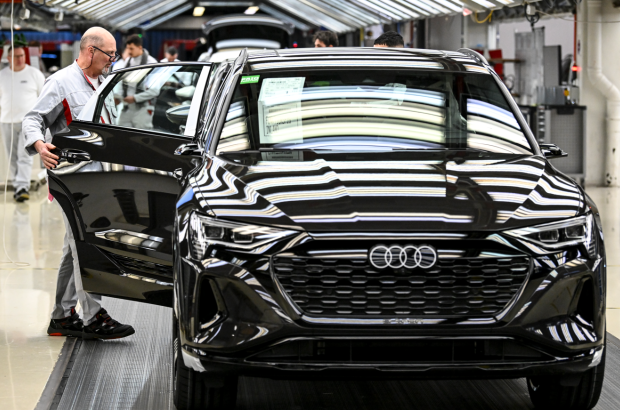- Daily & Weekly newsletters
- Buy & download The Bulletin
- Comment on our articles
Audi Brussels factory under threat of closure
Audi Brussels is at risk of closure following an announcement from management of "intentions to restructure".
The Brussels plant employs some 3,000 permanent workers who are now facing job insecurity as production of the Q8 e-tron, the only model made there, is likely to be stopped earlier than planned.
In its current restructuring proposal, German carmaker Audi plans to lay off 1,510 workers at its Brussels plant by the end of October, then 1,110 from next May, so that no one will be employed at the Brussels site by the end of 2025, according to liberal trade union ACLVB.
If Audi Brussels does close, it would solidify the gradual loss of Belgium’s status as a car producer over the past 30 years, following the exits of Ford in Genk in 2014 (nearly 4,000 jobs lost), Opel in Antwerp in 2010 (2,600 jobs lost) and Renault in Vilvoorde in 1997 (more than 3,000 jobs lost).
Volvo Car Ghent would then be the only major car plant in Belgium, employing almost 7,000 people to produce more than 230,000 vehicles last year.
Together with Audi Brussels’ production of around 53,000 cars, this is a total of less than 300,000 cars assembled in Belgium in 2023 – a sharp contrast to the early 2000s, when more than a million cars were assembled each year.
Despite Belgium's good reputation in the car manufacturing sector and its strategic position in Central Europe, manufacturers have been gradually disinvesting in the country for the last three decades.
In 2013, Belgian annual car production fell below the half-million mark.
Outgoing prime minister Alexander De Croo said he would receive the management and unions of Audi Brussels on Tuesday, together with a representative of Bart De Wever, the formator of the future federal government, in order to “receive explanations” and also “look together at what we can do to preserve as many jobs as possible”.
“The announcement [of restructuring plans] that has been made is not in line with what Audi's management has told us in the past,” De Croo said.
“Our country has assets, but Audi must of course tell us in which direction they want to go in terms of investment.”
The reason De Wever or a member of his team will also be present at talks with management and unions is that it will be up to the future government to consider any additional measures to “preserve as many industrial jobs as possible in our country”.
At the beginning of June, De Croo and his finance minister Vincent Van Peteghem presented Audi Brussels management with a letter of intent aimed at convincing the manufacturer to remain active in Belgium.
A working group made up of representatives of the various governments and the management of the car plant has already been set up.
Yet even if Audi were to leave Belgium, not all sector experts are pessimistic about the future of car manufacturing in the country.
“Because of the context of the site, I do see a future in Forest for another carmaker,” Johan Geeroms, auto industry expert and director of credit underwriting in the Benelux for Allianz Trade, told Bruzz.
“That factory has one trump card: agility. The production lines there are built in such a way that you can easily produce a different type of car there.”
Geeroms noted a number of factors that hurt Belgium’s status as a car manufacturer.
“The automotive sector and its suppliers remains the most important European industrial market, accounting for 20% of manufacturing value-added, but it’s struggling with two problems: lagging behind China and the disappointing total number of electric cars sold,” Geeroms said.
“China and South Korea started producing electric batteries 20 years ago, but the EU put the brakes on for too long, partly due to over-regulation and the powerful German and French car lobby.
"If you only produce one car whose sales disappoint, that's a very big problem. This is an expensive car. Audi has actually been playing with fire for years."
Competing with China is no easy feat for any country in the EU, added Geeroms.
“The EU does try to do something about this backlog, but it is an impossible battle – in China, there are no trade unions, car companies are actually state-owned enterprises, and ecological standards are given a run for their money.
"It's rather logical that China can produce electric cars at rock-bottom prices, but meanwhile, the quality of those Chinese cars is also rising,” Geeroms explained.
The top 10 battery producers for electric cars are all in Asia, and the top six are exclusively in China.
“But for a smaller brand with a car meant more for the masses, I still see a future at that [Brussels] site,” said Geeroms.
“I don't rule out a Chinese brand establishing itself there. Chinese carmakers have already settled in Sweden and Hungary. I think they will definitely look for possible hubs in other places in Europe as well.”

















